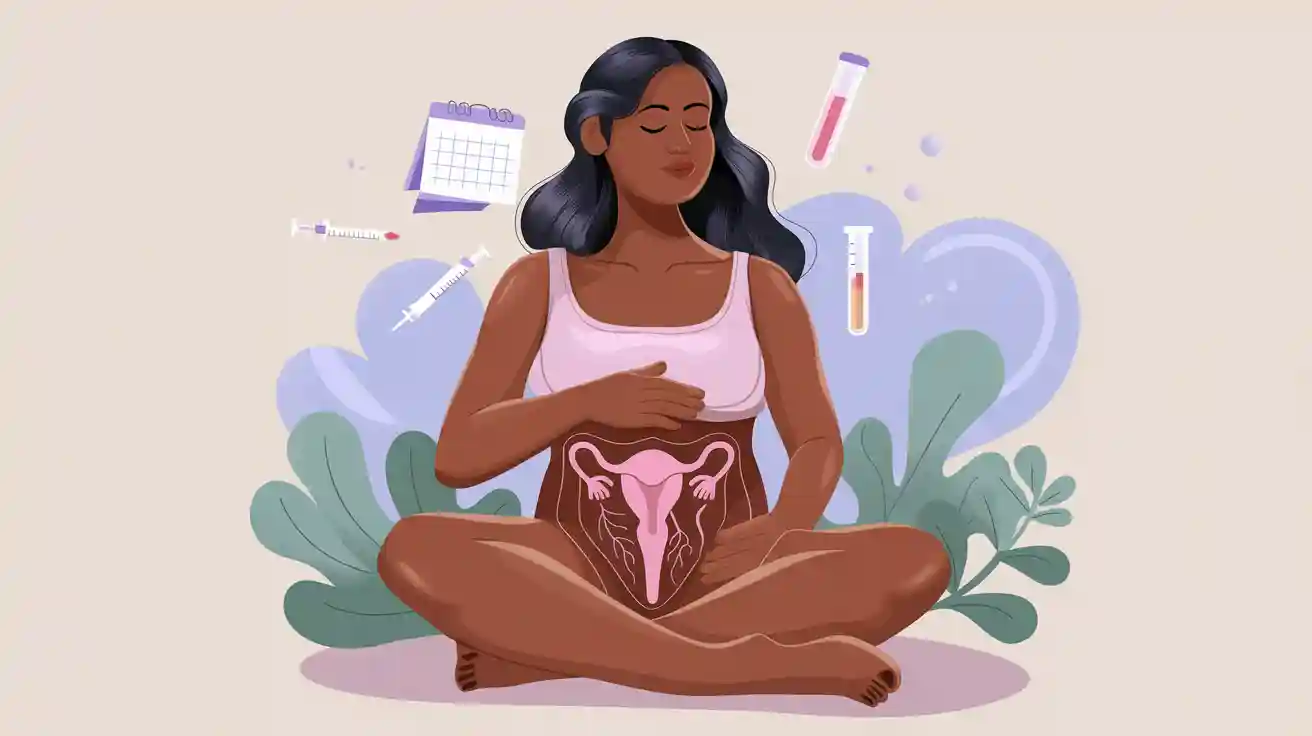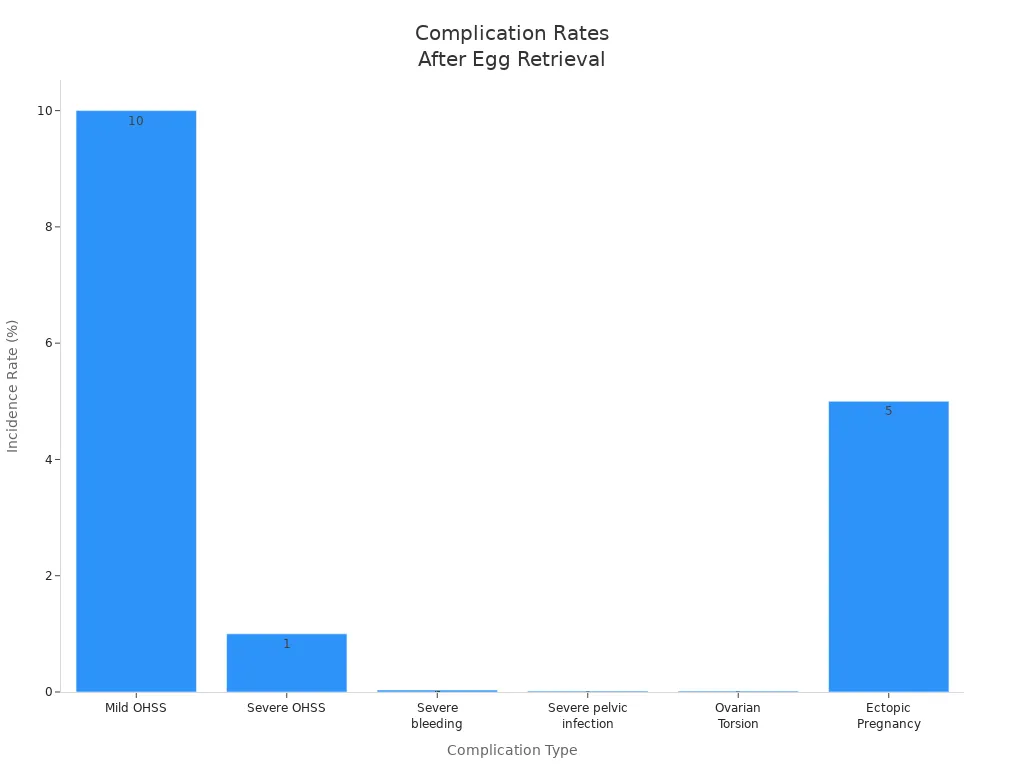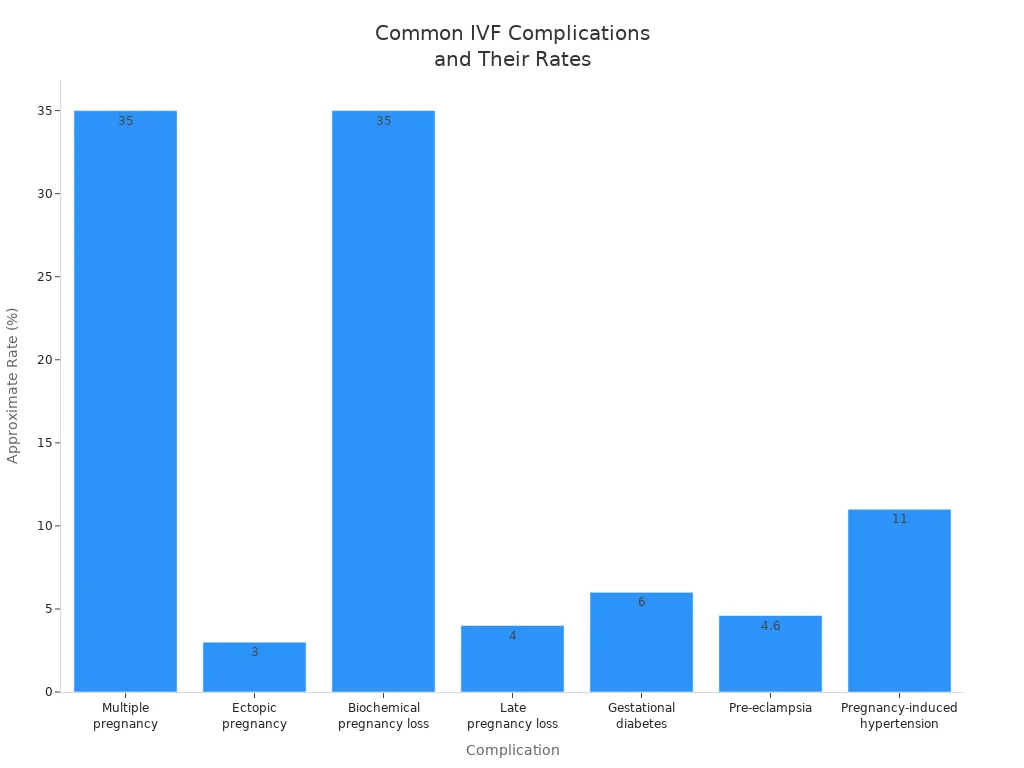What Happens to Your Body During IVF Treatment

You might see many changes in your body and mind when you begin IVF treatment. These changes are normal during in vitro fertilisation and fertility treatment. Many people feel stress from infertility and what others think. You may feel worried or sad, especially at the start of IVF. Some people worry about the price, extra treatments, or confusing test results. Others feel unsure about which information is true.
You can expect:
Emotional stress and not knowing what will happen during IVF and fertility treatment.
Questions about genetic tests, embryo quality, and IVF side effects.
Worries about the time, money, and effort needed for in vitro fertilisation.
You should always talk to your healthcare team if you feel unsure or find IVF fertility treatment too much.
Concerned about the cost? Check out how you can save up to 50% on your IVF treatment.
Key Takeaways
IVF treatment can make you feel bloated or have mild cramps. Your breasts might feel sore. You may get headaches and feel tired. These symptoms usually stop after treatment.
You might feel moody, anxious, or stressed during IVF. This is normal. Talking to your healthcare team or support groups can help you feel better.
Each IVF stage uses certain medicines. These can cause different side effects. Always tell your clinic about any symptoms or worries. This helps you get the right care.
Serious problems like ovarian hyperstimulation syndrome or infection are rare. But if you get these symptoms, you need quick medical help.
After embryo transfer, rest and healthy habits help your body. Do not lift heavy things. Do not drink alcohol. Try to avoid stress. Always follow your doctor’s advice.
Suppression Phase
Early IVF Side Effects
When the suppression phase starts, you take fertility medicines. These medicines help control your hormone levels. They get your body ready for the next steps in ivf. Suppression medicines like birth control pills or GnRH agonists stop early ovulation. You might notice some side effects from ivf at this time.
Sore breasts
Feeling sick
Mood swings
You could also have hot flushes, night sweats, headaches, or feel tired. These are normal side effects of ivf and do not last long. Some people get mild cramps or changes in how hungry they feel. You may feel more tired than normal, and it can be hard to focus. These signs show your body is reacting to the fertility drugs.
Suppression medicines lower your natural hormone levels, like FSH and LH. This lets your doctor control when ovulation and egg growth happen. Studies say longer suppression can make eggs and embryos better, but it does not always mean more pregnancies. These medicines do not have a big effect on your health, but you may need to visit the clinic more often during this part of treatment.
Emotional Changes
The suppression phase can change how you feel. You may feel more worried or have mood swings. It can be hard to sleep during this stage of ivf. Many people feel stress about infertility and all the steps in ivf. You might worry about side effects or feel unsure about what will happen next.
If these feelings are hard to handle, talk to your healthcare team. They can help you with the emotional side of treatment.
You may also feel upset by how long ivf takes or by all the medicines you need. Remember, these feelings are normal and part of going through infertility and ivf.
Ovarian Stimulation
IVF Medications and Symptoms
When you start ovarian stimulation, you take special ivf medicines. These medicines help your ovaries make more eggs. This step is important for collecting healthy eggs. Your doctor may talk about different medicines used in this stage.
Gonadotropins (FSH and LH): These medicines, like Gonal-F, Menopur, and Luveris, help your ovaries grow more eggs at once. They act like your body’s hormones but are stronger.
GnRH agonists and antagonists: Medicines such as Buserelin, Cetrotide, and Ganirelix stop your body from releasing eggs too soon. This helps your doctor choose the best time to collect eggs.
hCG: This is called the “trigger shot”. It helps your eggs finish growing and get ready for collection.
Oral ovulation induction agents: Letrozole and clomiphene citrate are sometimes used, especially if you have trouble with ovulation.
You might notice some symptoms while taking these ivf medicines. Your body reacts to higher hormone levels and extra eggs growing. Many people feel mild cramps, bloating, or sore breasts. Some get headaches, constipation, or spotting. You may see redness, swelling, or bruises where you inject the medicine.
If you feel worried about any symptoms, tell your healthcare team. They can help you with side effects and answer your questions.
Side Effects of IVF
IVF side effects during ovarian stimulation can affect your body and feelings. Most people notice changes in their body first. You may feel bloated or full in your stomach. Mild cramps and sore breasts are common. Some people feel tired or get headaches. You might see small bruises or redness where you had injections. Constipation and spotting can also happen.
Here is a list of common physical side effects during this stage:
Bloating
Sore breasts
Mild cramps
Constipation
Headaches
Injection site reactions (bruises, redness, swelling)
Spotting
Tiredness
A rare but serious risk is ovarian hyperstimulation syndrome (OHSS). OHSS happens when your ovaries react too much to the medicines. You may notice a swollen stomach, strong pain, sickness, vomiting, or trouble breathing. You might also pee less than normal. If you have these signs, contact your clinic straight away.
Study Type | Population/Period | Incidence Rate of OHSS | Additional Details |
|---|---|---|---|
Danish National Register Study | 186,168 stimulated IVF/ICSI cycles (2001-2017) | Annual incidence ranged 0.9% to 1.4%; 75% hospitalised >24h; early OHSS 48.5%, late OHSS 51.2% | |
Prospective Cohort Study | GnRH antagonist IVF cycles | Early OHSS 1.2%, Late OHSS 0.9%; late OHSS more severe and pregnancy-associated |
Most people do not get OHSS, but it is good to know the signs. Doctors say moderate-to-severe OHSS happens in about 1% to 5% of all ivf cycles.
IVF side effects are not just physical. Many people feel emotional changes during ovarian stimulation. You may feel more anxious or stressed than normal. Some people feel sad or cannot sleep well. These feelings are common for people having ivf. Anxiety and stress can feel stronger because you do not know how your body will react. You may also feel tired from the extra hormones and the pressure of the ivf cycle.
Remember, you are not alone. Many people feel the same way during in vitro fertilisation. If you find it hard to cope, talk to your healthcare team or a counsellor.
IVF side effects are different for everyone. Some people have only mild symptoms. Others feel more discomfort. Most side effects go away after ovarian stimulation ends. Your clinic will watch you closely and help you with any problems.
Egg Retrieval
IVF Treatment Procedure
Egg retrieval is an important part of the ivf process. This step comes after hormone stimulation and the trigger injection. Your doctor plans the egg collection about 35 hours after the trigger shot. The ivf procedure happens in a clinic or hospital.
You will lie on a bed in a special room. The team gives you monitored anaesthesia care. You get medicines like fentanyl and propofol. These medicines help you relax and stop pain. You stay deeply asleep but breathe by yourself. You do not need a breathing tube. The sedation works fast and wears off soon after.
The doctor uses an ultrasound probe to see your ovaries. A thin needle goes through the vaginal wall. The doctor guides the needle to each follicle. The needle gently takes out the fluid and eggs. The whole ivf procedure takes about 10 to 15 minutes. You do not need stitches or cuts. After the retrieval, you rest in a recovery area. Most people wake up in 30 minutes and can go home that day.
You might feel nervous before egg retrieval, but the team will explain everything and answer your questions.
Recovery and Risks
After egg retrieval, you may notice some side effects. These are common and usually mild. Most people feel well enough to do normal things the next day.
Common side effects after egg retrieval include:
Bloating or feeling full
Mild cramps, like period pain
Spotting or light bleeding
Constipation
Soreness in the pelvic area
Tiredness or fatigue
Nausea or vomiting (from anaesthesia)
You might also feel dizzy or confused as the anaesthesia wears off. Most people only need simple pain relief, like paracetamol.
If you have strong pain, heavy bleeding, or signs of infection (like fever or chills), call your clinic right away.
Some people have problems after egg retrieval, but this is rare. The risk is higher if you have many eggs, have had several ivf cycles, or if the procedure takes longer. Collecting more eggs can mean more discomfort.
Description | Frequency / Incidence Rate | |
|---|---|---|
Ovarian Hyperstimulation Syndrome (OHSS) | Caused by fertility drugs; symptoms range from mild bloating to severe needing hospital care. | Mild OHSS: ~10% of cases; Severe OHSS: <1% |
Bleeding | Usually minor, stopped by pressure; severe internal bleeding is rare. | Severe bleeding: 1 in 3,000 retrievals |
Infection | Risk of pelvic infection from the needle; antibiotics may help prevent this. | Severe pelvic infection: 1 in 6,000 retrievals |
Ovarian Torsion | Ovary or tube twists, cutting off blood supply; needs quick surgery. | 1 in 6,000 retrievals |
Ectopic Pregnancy | Embryo grows outside the uterus, often in tubes; needs quick care. | 5% incidence (twice natural conception rate) |
Pain | Gets worse with more eggs collected and longer procedure. | Varies; increases with oocyte number and time |
Serious complications (abscess, sepsis, organ injury) | Rare but possible. | Rare |

Most problems are not life-threatening. Severe pain happens in about 3% of people. Heavy bleeding or infection is very rare. Your clinic will watch you closely after the ivf procedure to keep you safe.
The egg retrieval step in ivf treatment is short and safe for most people. You may have mild discomfort, but serious problems are rare. Knowing what to expect helps you feel ready for this part of the ivf cycle. Always tell your healthcare team if you feel unwell or worried after the procedure.
Embryo Transfer
Immediate IVF Side Effects
The embryo transfer is quick and gentle. Most people do not feel pain. Some people feel a little cramp or pulling in the lower stomach. You might see a bit of clear or bloody fluid. This can happen when the doctor takes out the catheter or from the transfer itself.
You may notice other changes too. Sore breasts, tiredness, and changes in vaginal discharge are common. These symptoms often come from the hormones used in ivf. Light spotting or implantation bleeding can happen if the embryo sticks to the womb. This bleeding is lighter than a period and may look pink or brown.
Physical Sensation / Side Effect | Description / Cause |
|---|---|
Normal after the procedure; may signal implantation | |
Sore Breasts | Caused by hormone changes in ivf treatment |
Changes in Vaginal Discharge | Linked to hormones or medication |
Light Spotting / Implantation Bleeding | May occur if embryo implants; lighter than a period |
Fatigue | Result of hormone changes or the ivf process |
Not everyone will have these symptoms. If you do not feel anything, it does not mean the embryo transfer did not work. Watch for heavy bleeding, strong pain, fever, or odd discharge. These signs mean you should call your fertility team.
Aftercare in Fertility Treatment
After embryo transfer, you need to look after yourself. Rest for one or two days, but you do not need to stay in bed all the time. Light activities like reading or watching TV are fine. Do not lift heavy things or do hard exercise. Try not to strain your stomach muscles.
Eat healthy foods with protein, iron, and fibre. Drink enough water to stay hydrated. Do not drink alcohol, caffeine, or eat very spicy foods. Keep taking your medicines, especially progesterone, as your doctor says.
Try to relax by doing things you enjoy, like listening to music or writing. Talk with your partner or join a support group if you feel worried. Mild cramps or spotting are normal, but watch for warning signs.
Contact your clinic if you notice:
Heavy bleeding
Strong or worse pain
Fever
Bad-smelling or strange discharge
Dizziness or feeling faint
Plan to take a pregnancy test 10 to 14 days after the embryo transfer. Your clinic may ask you to do a blood test for the best result. Regular check-ups will help you stay healthy during your ivf treatment.
Pregnancy Outcomes and Risks
Complications After IVF Treatment
After ivf treatment, you might worry about risks during pregnancy. Some problems are more likely with ivf than natural conception. The most common is having twins or triplets. This happens when doctors put in more than one embryo. Multiple pregnancies can cause early birth and low birth weight. Both you and your babies may have health problems.
There is also a higher chance of ectopic pregnancy. This is when the embryo grows outside the womb. It can be dangerous and needs fast medical help. Miscarriage is another risk, and it gets higher as you get older. But studies say the risk of miscarriage or birth defects is not higher with ivf than natural conception.
Here is a table showing some common problems after ivf treatment:
Complication | Approximate Rate (%) |
|---|---|
Multiple pregnancy (twins) | 27–35 |
Ectopic pregnancy | 3 |
Biochemical pregnancy loss | 11–35 |
Late pregnancy loss | 2–4 |
Gestational diabetes | 6 |
Pre-eclampsia | 4.6 |
Pregnancy hypertension | 8.5–11 |

How well ivf works depends on your age and the type of embryo transfer. For example, women aged 36–37 have about a 40.8% live birth rate. This drops to 7% for women over 40. Using donor eggs from younger women can raise success rates to 70–80%. Frozen embryo transfers may lower the risk of early birth compared to fresh transfers.
Most people do not have serious problems after ivf treatment. Always watch for warning signs and talk to your healthcare team if you feel unwell.
Long-Term Side Effects of IVF
After ivf, you may notice some effects that last longer. Many people feel stress or mood changes, especially if the treatment does not work. You might feel sad, worried, or have trouble sleeping. These feelings usually get better, but support from friends, family, or a counsellor can help.
Some people worry about gaining weight after ivf. Research shows most people gain less than 1% of their body weight. This is not a big change. If you have polycystic ovary syndrome (PCOS), you may gain a bit more. Most people go back to their usual weight after treatment.
Physical health risks, like heart problems or cancer, do not seem to go up after ivf, especially if you get pregnant. For children born through ivf, studies show no big differences in health, growth, or development compared to children born naturally.
You may feel stressed after ivf, but most people get better. If you find it hard to cope, talking to your healthcare team can really help.
When you have ivf treatment, your body and feelings can change. You might feel bloated or get headaches. Some people have hot flushes. You may also feel stressed or anxious. Mood swings are common too. Most side effects are not serious and go away after treatment ends.
Drink water, eat healthy food, and try to relax to help with symptoms.
Getting help from your doctor, partner, or a support group can make things easier.
If you feel very unwell or have bad symptoms during ivf, call your clinic straight away.
FAQ
What symptoms should you expect during IVF treatment?
You may notice bloating, mild cramps, sore breasts, headaches, or tiredness. Some people feel emotional changes like mood swings or anxiety. These symptoms are common. Your clinic can help you manage them.
What happens if you miss an IVF medication dose?
Missing a dose can affect your treatment. You should contact your clinic straight away. They will tell you what to do next. Do not take extra medicine without advice.
What signs mean you need urgent medical help during IVF?
Watch for severe pain, heavy bleeding, fever, or trouble breathing. These signs could mean a serious problem. You should call your clinic or go to hospital if you notice them.
What can you do to feel better during IVF treatment?
You can rest, eat healthy food, and drink water. Gentle walks or relaxing activities may help. Support from friends, family, or a counsellor can make you feel better.
What should you avoid after embryo transfer?
You should avoid heavy lifting, hard exercise, alcohol, and caffeine. Try not to stress. Follow your doctor’s advice and keep taking your medicines as prescribed.
See Also
Key Information About IVF Expenses For New UK Patients
How Your Area Influences NHS IVF Waiting Periods
Important Facts About NHS IVF Waiting Times In 2025

